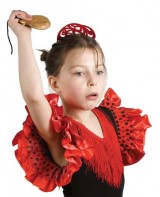Looking to cultivate Castilian in your classroom? A themed week is just the encouragement your children need, says Lucy Adamson...
 Getting everyone on board…
Getting everyone on board…
Before the week begins get all school staff together for a Spanish session. As well as learning some key phrases, you could all enjoy some tapas and sangría! It really helps if children are greeted consistently in Spanish by all members of staff throughout the week, so try to encourage everybody, including the caretaker and school secretary, to use “¡Hola!” and “¡Hasta luego!” wherever possible. You could ask the lunchtime staff to say “¡Qué aproveche!” to encourage children to try to order their food in Spanish. Whatever the children are asking staff for, there’ll be plenty of chances for them to practise “por favor” and “gracías”.
Try weaving Spanish into your daily assemblies, so children can perform what they have learnt in the new language. This could include whole-school singing in Spanish. Why not start off with some simple greetings? There’s a great example that you could use or adapt on the CILTPrimary Languages website (primarylanguages.org.uk). The ‘Greeting 2’ video clip – http://tiny.cc/akd5z – features a simple song that you can use regularly as part of your greetings routine in Spanish.
Another song that would work well in assembly is Mi barba tiene tres pelos, as children will love doing the actions too. For more ideas, the Mama Lisa website offers a wealth of support for traditional songs from Hispanic countries around the world. You could think about inviting a theatre group in for a whole-school performance or workshop. There are several companies that offer productions in Spanish, including the Freshwater Theatre Company (freshwater.co.uk) and Théâtre sans Frontières (tsf.org.uk).
Why not invite parents and friends of the school to a Spanish evening? This could be a celebration of language and culture, and include traditional, Spanishthemed food – for example tortilla and turrón. Children will love decorating the school for such an exciting event too. They may even be able to provide the evening’s entertainment – in Spanish of course!
 Play with the language…
Play with the language…
Playing games in Spanish is a great way to practise the language regularly throughout the week. If you have a Spanish foreign language assistant in school, they’ll be able to give you lots of ideas for authentic games, rhymes and songs. Equally, if you have Spanish-speaking children in school, they could make suggestions too.
One game that works really well is ‘number aerobics’, which combines maths and PE. The game is best played in a large open space like the hall or playground. You call out a number in Spanish and the children have to contort their bodies into that number. Start off simply using single figures where children work alone, and then, for numbers over 10, ask them to work in pairs. To make it harder, ask children to create the answer to a calculation. For example, if you say “veinte más cinco”, your class will have to work in pairs to create the shape for the number 25. Once children are confident with the game, they could take over calling out the numbers.
 Fun with Flamenco and Salsa…
Fun with Flamenco and Salsa…
Why not teach the children some flamenco or salsa dancing? Invite professional dancers to give a performance and teach the children, or teach them some basic routines yourself. You’ll find lots of support from Take 10 en español (deseducation.org) – the Hispanic dance DVD in this resource pack includes examples of both flamenco and salsa. The flamenco video clips are from a dance school in Seville and include an exciting tour of the city. You could practise the routines in PE lessons, and then encourage children to dress up in costumes for the final performance. They could also make and decorate their own fans and scarves to use during the flamenco dances.
 Investigating Spanish festivals…
Investigating Spanish festivals…
Children will really enjoy finding out about Spanish festivals. The song Siete de julío San Fermín is a great springboard into finding out about the tradition of bull running in Pamplona. Or why not investigate the origins of La Tomatina? This festival takes place in the Valencia region and involves throwing ripe tomatoes around. Re-enacting this in school could prove rather messy, so for a food-free alternative, why not make a colourful display. If you want a link to RE, try looking into Semana Santa. Children will be amazed to discover the incredible holy week processions that take place, particularly in Andalucía in southern Spain.
Virtual visits to Spanish-speaking countries…
 Combine Spanish with ICT and geography by ‘visiting’ Spain and other Spanish-speaking countries around the world. Using Google Earth (earth.google.com), you can now plan and record a virtual tour of, for example, Barcelona, taking children to places of interest. You might like children to then plan their own tours of a city or country and present them to the class using simple language, e.g. “Aquí está la Alhambra. Aquí está Bogotá, la capital de Columbia.”
Combine Spanish with ICT and geography by ‘visiting’ Spain and other Spanish-speaking countries around the world. Using Google Earth (earth.google.com), you can now plan and record a virtual tour of, for example, Barcelona, taking children to places of interest. You might like children to then plan their own tours of a city or country and present them to the class using simple language, e.g. “Aquí está la Alhambra. Aquí está Bogotá, la capital de Columbia.”
You can also visit museums and art galleries – on the Prado museum website (museoprado.mcu.es) you can view paintings from its collection. This could link in to work on a Spanish painter such as Goya or Velázquez. Lucy Adamson is Primary Language Teaching Adviser at CILT, the National Centre for Languages. primarylanguages.org.uk
 Link-up with a partner school…
Link-up with a partner school…
If you haven’t already done so, why not set up a link with a school in Spain or another Spanishspeaking country, and use Spanish week as a platform to launch the partnership? For Spain, try the etwinning website (etwinning.net), which is ideal for joint curriculum projects. For
Spanish-speaking countries around the world, try the Global Gateway (globalgateway.org). Spanish week can be a great opportunity to spend time on joint projects with your partner school. Have you thought about setting up a blog with them? Teaching each other songs, playing language games together and joint cookery master classes are just some of the great things you can do.
How to use Harry Potter to engage high-ability learners
Ace-Languages
Make World Book Day Extra Special This Year
Ace-English
Teaching five year olds to talk
Ace-Classroom-Support
